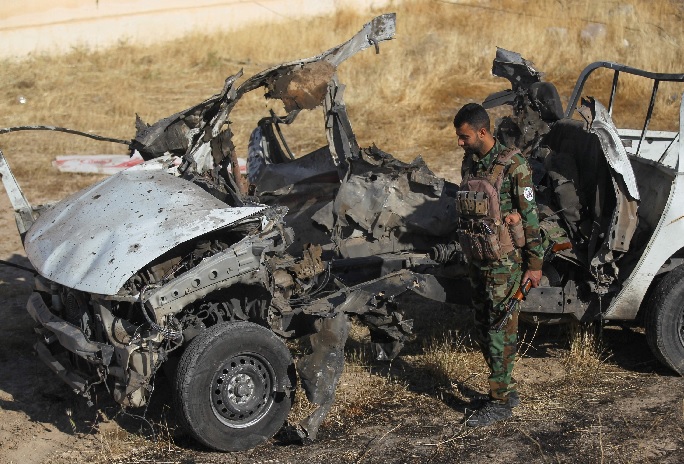
Amid the global health crisis resulting from the coronavirus pandemic, there are disturbing signs that Daesh is re-emerging, especially in the open deserts of Syria and Iraq. Last week, newly appointed Iraqi Prime Minister Mustafa Al-Kadhimi announced that Iraqi forces had foiled a major operation by Daesh, while his intelligence body revealed it had arrested a key figure in the group, Abdel Nasser Qardash, who is thought to have been nominated as the successor to Abu Bakr Al-Baghdadi, who was killed by US Special Forces in Idlib last October.
Reports point to the fact that clusters of the extremist group have become active in Iraq, especially during Ramadan. Militants have struck several military and civilian targets in western and central Iraq in recent weeks. The head of Iraq’s joint military operations, Maj. Gen. Tahsin Al-Khafaji, confirmed that Daesh-related attacks had increased as the country shifted its resources toward containing the spread of the coronavirus.
The scene is even worse in Syria, where Daesh militants claimed responsibility for a number of bloody attacks against pro-Damascus militias, as well as Syrian Democratic Forces (SDF) fighters, during Ramadan. The Syrian Human Rights Observatory announced that no less than 60 government and SDF members have been killed in Homs and Deir Ezzor in the past few weeks, while Daesh claimed responsibility for a number of these attacks. On Friday, US Central Command announced that coalition forces had killed two key Daesh leaders in an airstrike in Deir Ezzor.
Following the group’s defeat in Syria in March last year, thousands of Daesh fighters were taken prisoner by the SDF in northeastern Syria. Efforts to repatriate foreign fighters have failed, while the SDF’s hold weakened as a result of attacks against its positions by Turkish troops and pro-Ankara rebel groups. In October, it was reported that hundreds of Daesh fighters had escaped from internment camps in northern Syria. Experts believe that most of them were able to regroup while hiding in the vast deserts straddling Syria and Iraq.
Iraq had declared victory over Daesh in 2017, but political squabbling, Iranian interventions in Iraqi affairs and the controversial role played by the pro-Iran Popular Mobilization Forces (PMF) deflected attention from the main task of rounding up the hundreds of Daesh fighters who were able to flee. Tensions between the US and Iran, especially following January’s assassination of Iranian commander Qassem Soleimani and a PMF leader near Baghdad airport, have allowed clusters of Daesh fighters to regroup and carry out fresh attacks.
There is no doubt that Daesh, like Al-Qaeda, is changing its strategy and trying to adapt to new geopolitical realities. With Russia, Turkey, the US and Iran carrying out conflicting agendas in Syria, and with economic and political turmoil still crippling Iraq, militants are making good use of the resultant vacuum.
What is particularly worrying is that the nefarious ideology perpetuated by Daesh continues to attract volunteers at various levels. The lack of a political solution in Syria has compounded the humanitarian catastrophe there, allowing Daesh to pursue its recruitment efforts. A dysfunctional sectarian-based political system in Iraq has failed to stamp out corruption, end ethnic and sectarian tensions, and undercut foreign interference in Iraqi affairs. Again, under an inequitable system that disenfranchises millions, Daesh is bound to find disillusioned supporters.
Meanwhile, the international coalition against Daesh is unraveling for a number of reasons. Iraqis want the US and its NATO allies out of their country, while demanding an end to Tehran’s interventions. And fighting the coronavirus crisis and containing its dire economic and social consequences has become the main objective for most world governments. But these governments should be aware that the current health crisis will deepen socioeconomic disparities in the form of rising poverty and unemployment rates as economies struggle to recover. In the absence of transparency, good governance and openness, extremist ideologies can only flourish. Opting for an iron-fist rule, under the guise of fighting the pandemic, could easily backfire.
In the absence of transparency, good governance and openness, extremist ideologies can only flourish.
Osama Al-SharifAnd even when the dust settles and the coronavirus is contained, we must remember that our region continues to suffer from civil wars, foreign interventions and sectarian divides — all elements that contribute to instability, injustice and radical backlashes. We are yet to see an end to the conflicts in Yemen, Syria, Iraq and Libya, among others. All of these ongoing conflicts could act as incubators for Daesh-like groups.
Security solutions are needed momentarily to offset a regional threat that can still be contained. But governments must look beyond the short term and focus on the core reasons why extremist ideologies continue to attract disillusioned men and women. While Daesh may never be able to repeat its initial success of building an entity that stretched between Syria and Iraq, resulting in horrific and unforgettable crimes against humanity, states cannot afford to look the other way as militants attempt to regroup. Taking our eyes off Daesh at this critical moment may prove catastrophic.
 Eurasia Press & News
Eurasia Press & News

